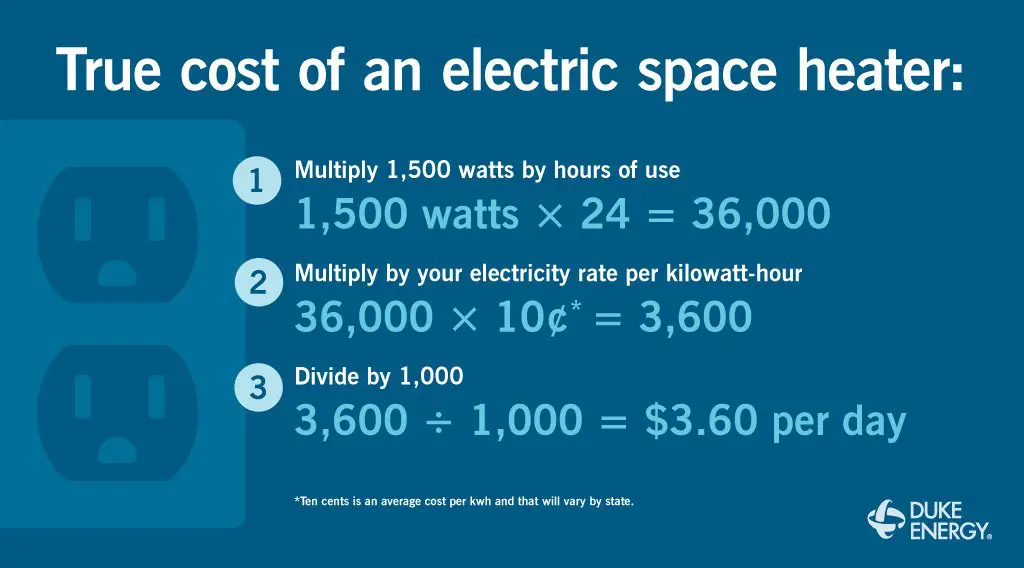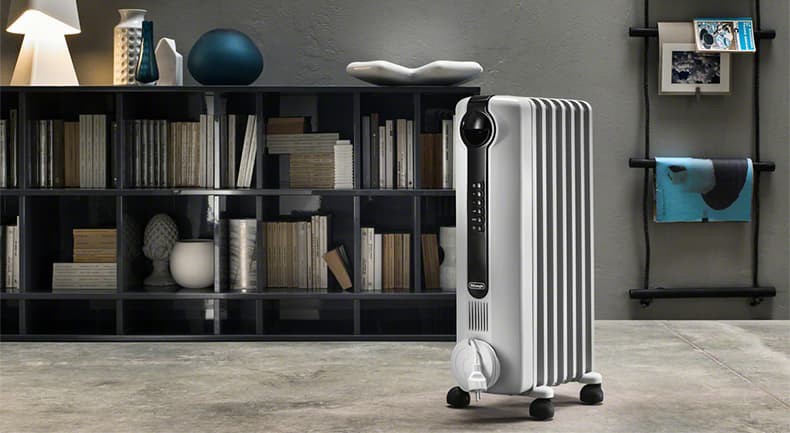A space heater typically uses around 0.75 to 1.5 kilowatts of power per hour. This varies based on the model and size.
Space heaters are a convenient way to heat specific areas in a home efficiently. They usually consume between 0. 75 to 1. 5 kilowatts of power per hour, depending on their wattage and settings. Understanding the energy usage of a space heater can help homeowners manage their electricity costs effectively while staying warm and comfortable.
By knowing the kilowatt consumption of different space heater models, individuals can make informed decisions about selecting the most energy-efficient option for their heating needs. Let’s explore the factors affecting space heater energy consumption and how to optimize its usage for cost-effective heating solutions.

Understanding Space Heaters
Understanding Space Heaters:
Types Of Heaters:
When it comes to space heaters, there are various types that cater to different heating needs:
- Electric heaters
- Infrared heaters
- Ceramic heaters
- Fan heaters
- Immersion heaters
Electric Heater Functionality:
Electric heaters work by utilizing electricity to generate heat, suitable for heating small areas efficiently. They can operate by forcing air over wires or using infrared elements to heat objects in the room.

Credit: www.amazon.com
Energy Consumption Of Space Heaters
A space heater’s energy consumption is essential to consider for efficient use. Understanding electricity usage and calculating kilowatt usage helps save on energy bills.
Electricity Usage
Space heaters typically run on electricity, with wattage ranging from 500 to 1500 watts. Constant operation can spike energy consumption.
Calculating Kilowatt Usage
To determine the kilowatt usage, divide the wattage of the space heater by 1000. For example, a 1200-watt heater equals 1.2 kilowatts per hour.
Evaluating Costs
When considering the use of a space heater, it’s crucial to evaluate the associated costs. Understanding the electricity usage and its corresponding expenses will help you make informed decisions about using a space heater effectively and economically. Let’s take a closer look at the various aspects of evaluating the costs of running a space heater.
Electricity Costs
Electricity costs vary depending on your location and utility rates. In general, the average cost of electricity per kilowatt-hour (kWh) can range from 12 to 30 cents. When calculating the electricity cost for running a space heater, it’s essential to consider your specific electricity rates to get an accurate estimate of the expenses.
Monthly Usage Expenses
Determining the monthly usage expenses for a space heater involves estimating the kilowatt-hours consumed and multiplying it by the electricity cost per kWh. For example, a typical space heater rated at 1500 watts (1.5 kilowatts) operating for 8 hours a day would consume 12 kWh daily. Multiply this by the electricity cost per kWh to calculate the daily usage expenses, and then multiply by the number of days in the month to get an estimate of the monthly expenses.
By understanding and evaluating the electricity costs and monthly usage expenses, you can make informed decisions about using a space heater while managing your energy expenses effectively.
Efficiency And Savings
A space heater typically uses 750 to 1500 watts, depending on its size and settings. By efficiently using a space heater, you can save on heating costs and reduce energy consumption. Consider the wattage of the heater and how it aligns with your specific heating needs to maximize efficiency and achieve savings.
Optimizing Heater Efficiency
When it comes to using a space heater, optimizing its efficiency is key to saving both energy and money. By following these simple steps, you can ensure that your space heater operates at its maximum efficiency:
- Choose the right size: Select a heater that is the appropriate size for the space you want to heat. A heater that is too small may struggle to warm up the room, while a heater that is too large will consume more energy than necessary.
- Focus on insulation: Before turning on your space heater, make sure that your room is properly insulated. Seal any cracks or gaps in doors, windows, and walls to prevent heat from escaping and cold air from entering.
- Keep it clean: Regularly clean your heater to ensure optimal performance. Dust and debris can accumulate on the heating elements, reducing their efficiency. A clean heater will heat up your space more quickly and effectively.
- Utilize a programmable thermostat: Investing in a space heater with a programmable thermostat can help you save energy. Set the thermostat to lower temperatures when you’re not in the room, and schedule it to start heating before you return.
- Consider supplementary heating options: Instead of relying solely on your space heater, use it as a supplementary heat source. Combine it with other heating methods, such as central heating or a fireplace, to reduce the workload on the space heater.
Financial Benefits
Optimizing the efficiency of your space heater not only saves energy but also results in financial benefits. By using your space heater more efficiently, you can expect to see the following financial advantages:
- Lower energy bills: By consuming less electricity, your space heater will reduce your energy consumption and lower your energy bills. This can have a significant impact on your monthly expenses.
- Heat specific areas: Unlike central heating systems, space heaters allow you to heat specific areas in your home. By heating only the rooms you use frequently, you can avoid wasting energy on unoccupied spaces.
- Reduced heating costs: If you primarily use your space heater to supplement your main heating system, you can significantly reduce your overall heating costs. Using a space heater in the rooms you spend the most time in can lower the need for higher energy-consuming heating methods.
- No additional installation expenses: Compared to other heating systems, space heaters do not require any additional installation costs. They are easy to set up and can be plugged into any standard electrical outlet, making them a cost-effective heating option.
Comparing Heater Types
When comparing heater types, it’s essential to consider the kilowatts used. Space heaters typically consume varying kilowatts depending on the type and size. Understanding the energy consumption of a space heater can help manage electricity costs effectively.
Infrared Heaters
Infrared heaters are a popular choice when it comes to space heaters. They use infrared radiation to heat objects directly instead of heating the air. This means that they provide instant heat and are efficient in maintaining warmth in a specific space. Infrared heaters operate using electricity and can range from 300 to 1500 watts of power.
One of the benefits of infrared heaters is that they don’t dry out the air like other types of heaters. This makes them a great option for individuals who are looking for a heater that doesn’t affect humidity levels or cause discomfort.
Moreover, infrared heaters are known for being silent and odorless, making them perfect for bedrooms, offices, and living rooms. They are also portable and lightweight, allowing you to easily move them from one room to another.
Ceramic Heaters
Ceramic heaters are another popular type of electric space heater. They use ceramic heating elements to warm the air in a room. These heaters are known for their energy efficiency and quick heat-up time.
Typically, ceramic heaters come in different sizes and wattages. The wattage can range from 750 to 1500 watts, depending on the size and power of the heater. The advantage of ceramic heaters is that they distribute heat evenly throughout the room, ensuring that every corner is kept warm.
Additionally, ceramic heaters often come with adjustable thermostats and built-in safety features, such as automatic shut-off functions and overheating protection. This makes them a safe and reliable choice for keeping your space cozy during the colder months.
Overall, both infrared and ceramic heaters have their advantages and are suitable for different environments and preferences. When choosing a space heater, consider the size of the room, your heating needs, and any additional features that may be important to you.

Credit: www.amazon.com

Credit: www.sylvane.com
Frequently Asked Questions On How Many Kilowatts Does A Space Heater Use
How Much Does It Cost To Run A 1500 Watt Heater For 24 Hours?
Running a 1500 watt heater for 24 hours costs around $3. 60 based on an average electricity rate.
Do Space Heaters Use A Lot Of Electricity?
Yes, space heaters can use a lot of electricity, ranging from 750 to 1500 watts per hour.
How Many Kilowatts Does A 1500 Watt Heater Use?
A 1500 watt heater uses 1. 5 kilowatts of power.
How Much Does It Cost To Run A 1500 Watt Heater For 24 Hours Uk?
Running a 1500 watt heater for 24 hours in the UK would cost approximately £72. This cost is based on the average electricity rate of 16p per kilowatt-hour in the UK.
How Many Kilowatts Does A Space Heater Typically Use?
A space heater typically uses between 0. 5 to 1. 5 kilowatts, depending on the size and type of heater.
Conclusion
Understanding the kilowatt usage of a space heater can help you manage electricity costs. By selecting an energy-efficient model and using it wisely, you can effectively heat your space while minimizing energy consumption. Carefully assessing your heating needs and making informed choices can lead to significant savings over time.
